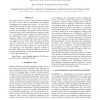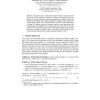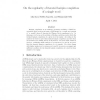3172 search results - page 13 / 635 » On the Random-Self-Reducibility of Complete Sets |
ICASSP
2011
IEEE
13 years 1 months ago
2011
IEEE
This paper presents our work on rapid language adaptation of acoustic models based on multilingual cross-language bootstrapping and unsupervised training. We used Automatic Speech...
PODS
2011
ACM
13 years 20 days ago
2011
ACM
In the traditional data exchange setting, source instances are restricted to be complete in the sense that every fact is either true or false in these instances. Although natural ...
CP
2010
Springer
13 years 8 months ago
2010
Springer
We present a new complete multi-valued SAT solver, based on current state-of-the-art SAT technology. It features watched literal propagation and conflict driven clause learning. W...
CORR
2011
Springer
13 years 4 months ago
2011
Springer
Hairpin completion is an abstract operation modeling a DNA biooperation which receives as input a DNA strand w = xαyα, and outputs w = xαy¯αx, where x denotes the Watson-Cric...
SOFSEM
2012
Springer
12 years 5 months ago
2012
Springer
Abstract. Iterated hairpin completion is an operation on formal languages that is inspired by the hairpin formation in DNA biochemistry. Iterated hairpin completion of a word (or m...



